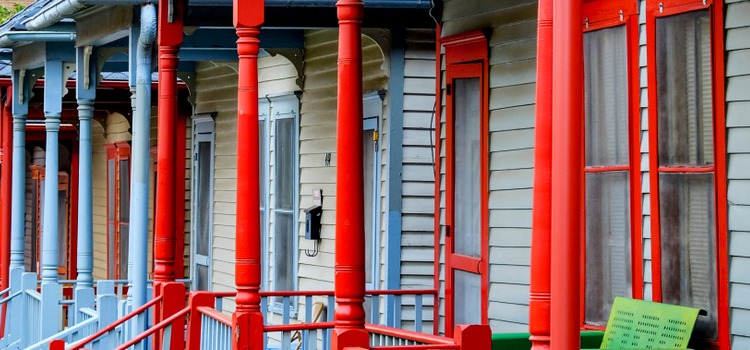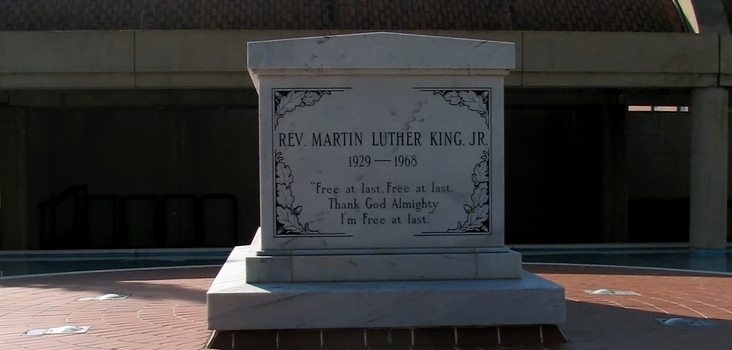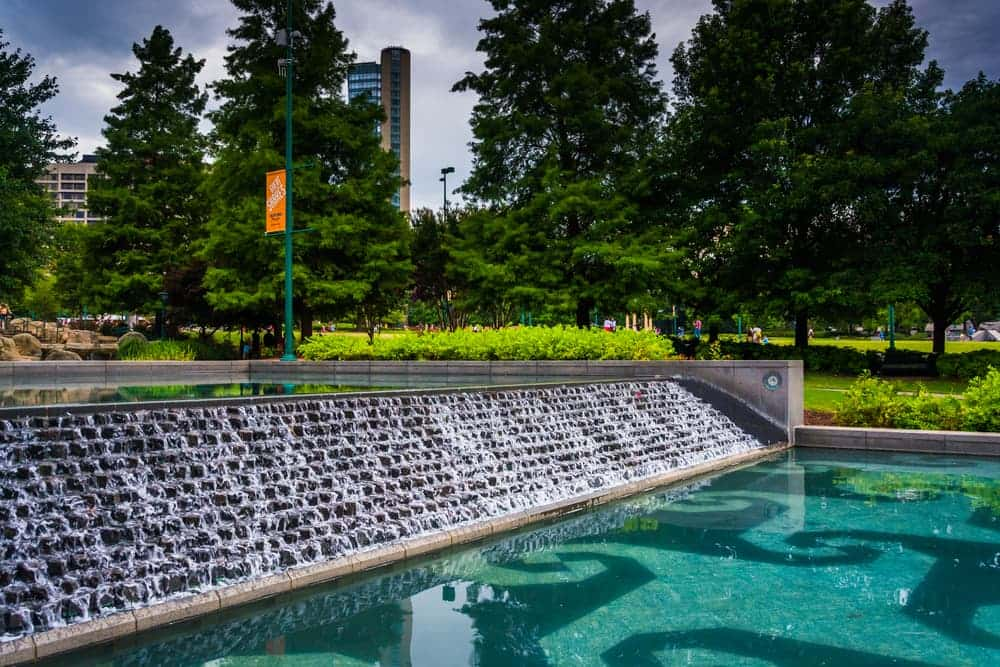When you book with Falcon Charter Bus, you can enjoy customized bus rentals that run on your schedule. See what you want to see and leave the driving to a professional bus driver. While you ride from one destination to another, you can enjoy WiFi and power outlets to keep devices charged and help you read up on each stop; air conditioning to combat the Atlanta heat; and reclining seats for quick power naps between tours.
We charter full-size buses for large school group trips, compact minibuses for smaller groups of friends, and various sizes in between to help your group get around Atlanta safely and efficiently. Call us today to learn more and to get a free quote on your charter bus rental in Atlanta!

Day 1: Sweet Auburn Historic District
Sweet Auburn District was the first African-American business district in downtown Atlanta, covering a mile and a half of Auburn Avenue.
APEX Museum
The African-American Panoramic Experience (APEX) museum showcases the social contributions and promotes cultural awareness of African-Americans in Georgia. The museum was founded in 1978, making it the oldest Black history museum in Atlanta.
You'll find various exhibits depicting African-American history at the APEX museum, including stories of the oppression the Black community has gone through over the years and their journey to liberation.
The APEX museum is located at 135 Auburn Ave., NE.
Charter bus tip: Car parking is difficult along Auburn Avenue, but your charter bus driver can drop you off at the museum and pick you up when you’re ready to move to your next destination.
Auburn Avenue Research Library
Continuing with the spirit of learning about African-American history, the next stop in our Civil Rights Tour is the Auburn Avenue Research Library on African-American Culture and History. The library has a vast collection of material covering African-American culture, from Carole Boston Weatherford’s The Roots of Rap to comic books created by African-American authors and illustrators.
With its dedication to studying African-American culture and history, you'll leave the Auburn Avenue Research Library with fresh perspectives and new insights into Black culture.
The Auburn Avenue Research Library on African-American Culture and History is located at 101 Auburn Avenue, NE.
Big Bethel AME Church
After the research library, your group can continue down Auburn Avenue with the Big Bethel AME Church. The church is hard to miss with its impressive Romanesque Revival style and tall steeple.
Founded in 1840 by enslaved members of the White Union Church, Big Bethel is considered the oldest African-American church on Auburn Avenue. The church is an important part of the educational history of Atlanta's African-American community, as it housed their first public school. The basement of the church is also home to Morris Brown College. Dr. King appeared at Big Bethel for an NAACP rally in 1957, after the Montgomery Bus Boycott.
Big Bethel AME Church is located at 220 Auburn Ave., NE.
Martin Luther King, Jr. National Historical Park
Your Civil Rights Tour should definitely include the highlight of Auburn Avenue — the Martin Luther King, Jr. National Historical Park. The park features notable sites, including Dr. King's birth home, place of worship, and final resting place.
Since most points of interest are within walking distance, you can explore on foot after a short ride in your charter bus. Here are some sites where you can absorb Dr. King's impact on social change.
Visitor Center
Before exploring the National Park, be sure to stop at the Visitor Center. The helpful staff at the information desk will let you know which sites are open during your visit and answer any questions you might have. You can also sign up for the ranger-led Birth Home tour.
The Visitor Center features an exhibit called the “Children of Courage," which showcases the contributions of children to the Civil Rights Movement and today’s movements.
Martin Luther King, Jr.’s Birth Home
The two-story frame Queen Anne-style house was Dr. King's home for the first twelve years of his life. This is where Dr. King played as a child and his views developed.
The park rangers lead tours of the interior of the home. To join, be sure to arrive early, as the Birth Home tours are first-come, first-served, and only allow 15 people at a time.
Dr. King’s birth home is located at 501 Auburn Ave., NE.
Ebenezer Baptist Church
Among the churches on Auburn Avenue, Ebenezer Baptist Church is considered the most important, as this is where Dr. King, his father, and his grandfather preached. On days when Dr. King was not fighting for change during the Civil Rights Movement, he was here at his church, preaching to his congregation.
The Ebenezer Baptist Church is also the site of Dr. King’s funeral and where Dr. King’s mother, Alberta Williams King, was murdered during a morning service in 1974.
The Ebenezer Baptist Church is located at 101 Jackson St., NE.
Prince Hall Masonic Grand Lodge
Despite predating the movement, the Prince Hall Masonic Grand Lodge played an important role in the Civil Rights Movement as the headquarters of the Southern Christian Leadership Conference (SCLC). During Dr. King’s tenure as president of the SCLC, countless protests and marches were planned in the lodge. However, the building was also home to the country’s first African-American radio station, WERD.
In 1937, the mayor of Sweet Auburn, John Wesley Dobbs, built the Prince Hall Masonic Grand Lodge and organized black voter registration there. He also formed the Atlanta Negro Voters League (ANVL) in 1936.
Prince Hall Masonic Grand Lodge is located at 330 Auburn Ave., NE.
The King Center
Across the street from Dr. King’s birth home lies The King Center, where you can find the tombs of Dr. King and his wife, Coretta Scott King.
Many visitors are fascinated while browsing through the King Library and Archives at The King Center. It's the largest repository of primary source materials on Dr. King as well as the Civil Rights Movement. You can continue learning about Dr. King’s legacy by visiting his tomb and reading about his advocacy and teachings.
The Martin Luther King, Jr. Center for Nonviolent Social Change is located at 449 Auburn Ave., NE.

Wheat Street Baptist Church
One of the many influences on young Dr. King was Williams Holmes Borders, the pastor of Wheat Street Baptist Church. Pastor Borders worked to desegregate Atlanta’s public transportation system in 1957, making him a prominent civil rights activist.
Wheat Street Baptist Church can be found at 359 Auburn Ave., NE.
Municipal Market of Atlanta
If you're getting hungry from all the walking and exploring, stop at the Municipal Market of Atlanta on Edgewood Avenue near Auburn, where you can enjoy fresh produce and good food.
Established in 1918, the Municipal Market of Atlanta is where farmers brought their livestock and produce to sell. Later, the Atlanta Women’s Club launched a fund-raising drive to build a fireproof brick structure for the market. In 1925, the new structure opened for business. Although Black people were allowed to shop inside, they could only sell their products on the curb outside.
Today, the Sweet Auburn Curb Market features numerous independently-owned spaces with retailers selling products such as gifts, sweets, and baked goods to meats, seafood, and farm produce. The curb market also has a food court where you can enjoy good food and company.
The Municipal Market is located at 209 Edgewood Ave., SE.
Day 2: Stories of the Past for a Better Future
After exploring Auburn Avenue, your tour will branch out to sites across the city that are significant to civil rights history. If you want to bring along snacks and drinks to keep your group going on your tour, your charter bus will have plenty of space for coolers and other essentials so no one gets sleepy along the way.
Hammonds House Museum
Founded in 1988, the Hammonds House Museum is the only Atlanta fine arts museum for African-American artists. Its 350-piece collection includes the work of artists from the late 19th century to today.
The Hammonds House Museum is also a part of Atlanta’s history. This 19th-century Victorian home is located in Atlanta’s historic West End neighborhood. If you love art, it’s a great place to appreciate African-American art.
You can find the Hammonds House Museum at 503 Peeples St., SW.
Herndon Home Museum
The Herndon Home Museum pays tribute to Alonzo Herndon, the first African-American millionaire in Atlanta and founder of Atlanta Life Insurance Company. You can walk through the Herndon mansion and learn about his life, from his rise from slavery to his exemplary leadership in the African-American business community.
The Herndon Home Museum is a privately-owned museum located at 587 University Pl, NW.
Jimmy Carter Presidential Library and Museum
Four miles from the Herndon Home Museum is the Jimmy Carter Presidential Library and Museum, home to two exhibits dedicated to the Civil Rights Movement. The first one, the Faith Exhibit, focuses on Dr. King’s father, Martin Luther King, Sr. The other exhibit is titled Day in the Life of a President and highlights President Carter’s visit to the Lorraine Motel after the assassination of Dr. King.
The Presidential Library is located at 441 John Lewis Freedom Pkwy, NE.
Charter bus tip: There is a designated parking space for charter buses near the museum’s entrance.
National Center for Civil and Human Rights
A trip to learn more about the Civil Rights Movement would not be complete without learning about human rights in general. A visit to the National Center for Civil and Human Rights is a perfect way to end your Civil Rights Tour.
The museum hosts exhibits about the Civil Rights Movement, which span multiple floors. You'll also find exhibits that showcase the Global Human Rights Movement and highlight how marginalized groups of the past and present fight oppression and discrimination all over the world. In addition, the exhibit offers a guide on how you can make a change and support human rights in today’s society.
The National Center for Civil and Human Rights is located at 100 Ivan Allen Jr Blvd., NW.
Explore Atlanta’s Civil Rights History with Falcon Charter Bus
Need group transportation for your Atlanta civil rights history tour? Falcon Charter Bus is always prepared to pair you with the perfect bus rental for your trip, whether you’re traveling with a small handful of local history buffs or bringing in a large school group on a charter bus from Birmingham. Give us a call today at 404-400-3545 to learn more about Atlanta charter bus rental options and to get a free, no-obligation quote!







